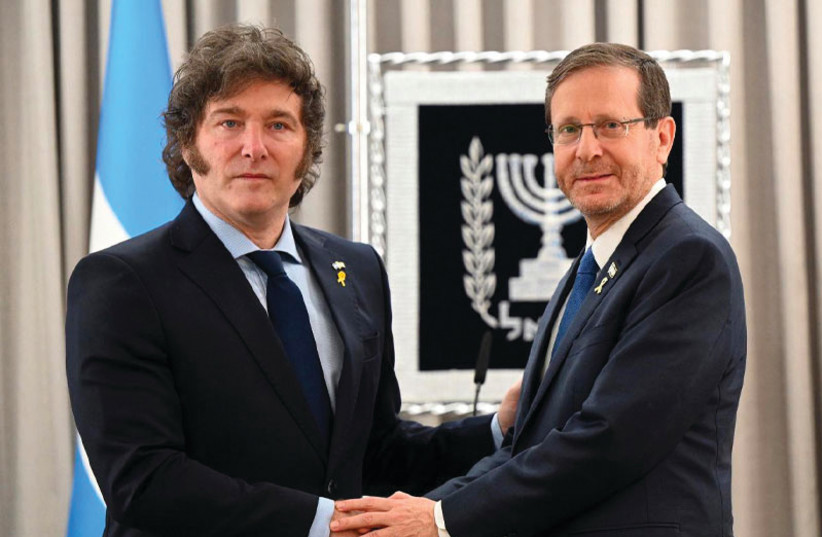
The visit to Israel last week by Santiago Pena, the president of Paraguay, led to an increase in the number of embassies in Jerusalem.
The count is now six official embassies, plus two solidarity embassies: the Christian Embassy that opened in Jerusalem in September 1980, and the Indigenous Embassy that opened in February this year.
Scores of countries are represented in the membership of these two embassies, and the members not only advocate for Israel but also tithe themselves for Israel and help the disadvantaged, new immigrants, Holocaust survivors, and senior citizens.
Pena’s visit was characterized as an official visit rather than a state visit. This meant that one factor was missing in all the pomp and ceremony – a representative group of different faith leaders in the reception line that greeted Pena on arrival at the President’s Residence, where he and his wife were greeted by President Isaac Herzog and his wife, Michal.
Whatever protocol calls it, Pena certainly got to see a lot of Jerusalem – the Knesset, the Western Wall, Yad Vashem, the Friends of Zion Museum, the Hebrew University, and more.

Only a few days later, members of the Latin American community came together again – this time at the Foreign Affairs Ministry to celebrate the 75th anniversary of Israel-Argentina diplomatic relations. Among those present were ambassadors and other dignitaries who had attended events involving the president of Paraguay. President Herzog and Knesset Speaker Amir Ohana attended.
Hadassah Academic College helping French olim
■ TO AID the integration of French immigrant students, Hadassah Academic College in cooperation with the Aliyah and Integration Ministry has introduced a new program, OPTIL. This is a special first-degree course in optometry designed to enable French students to feel comfortable in the Israeli academic system.
Twenty-eight immigrant students are currently enrolled in the course, which includes special classes in Hebrew and English. Immigration Minister Ofir Sofer was present at the opening of the new course and met personally with the students.
According to Prof. Ariela Gordon Shaag, president of the college, inquiries from abroad – especially from France – from people contemplating aliyah has increased dramatically, as have new immigrant students from France. Sofer said that all together, his ministry has initiated 27 programs to help absorb new immigrant students.
It is interesting that so many students from France are keen to study optometry. Anyone walking around midtown, particularly on or near Ben-Yehuda Street, cannot help but notice the number of optometry stores that have sprung up – perhaps inspired by the success of French tycoon Laurent Levy, whose business interests also include hearing aids and real estate development.
Aside from that, optometry appears to be another proof that what goes around comes around. A little over 20 years ago, eyeglasses were being cast aside in favor of laser surgery or contact lenses. But nowadays, increasing numbers of people are wearing glasses, and most pharmacies are selling non-prescription glasses.
Awards and grants for Hebrew University of Jerusalem academics
■ IN 2025, the Hebrew University will celebrate its centenary, and presumably a lot more will be heard about its groundbreaking research, outstanding scholars, and history. But as a prelude to all that, several academics have this year been the recipients of prestigious awards and grants.
Among them are Prof. Dina Schneidman and Prof. Yoel Greenberg, who have received European Research Council (ERC) grants for researchers leading innovative projects, each valued at approximately two million euros. The two recipients join a long tradition of Hebrew University scholars who have been recognized with this honor in previous years.
Schneidman, of The Rachel and Selim Benin School of Computer Science and Engineering, received the grant for her research titled “Deep Learning for Structure-Based Discovery of Adaptive Immune Receptors.” She focuses on the human immune system’s adaptive receptors, which identify and combat pathogens. Her project leverages geometric deep learning to predict accurate 3D structures of immune receptors, overcoming limitations caused by their rapid evolution. The tools developed are expected to transform immune research, advance vaccine development, and support breakthroughs in cancer and autoimmune treatments.
Greenberg, from the Department of Musicology, received the grant for his research titled “Toward a Diachronic Music Theory.” His research aims to revolutionize the field of music theory by shifting focus from rigid temporal frameworks to the processes of stylistic change over time. This groundbreaking approach involves analyzing thousands of musical works composed between 1680 and 1829 to uncover how stylistic shifts emerged – providing a flexible framework for reexamining music theory and its methodologies in the digital age.
A fun Friday activity in Jerusalem
■ NOW THAT we have passed the shortest day of the year, the days are once more getting longer, and people have more time for leisurely activities on Fridays.
The opening of the exhibition “Agnon in Color” will take place at the White Gallery of the Jerusalem Theatre on Friday, January 3, at 10 a.m. The exhibition will be on display from January 1-30. On Friday, January 10, when the days will be even longer, there will be a gallery talk at 11 a.m. by Harry Langbeheim.
greerfc@gmail.com
